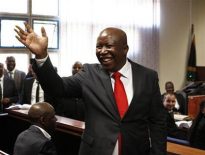(Reuters) – As hundreds of world leaders and diplomats converged on New York for the United Nations General Assembly’s annual meeting, President Barack Obama teed up a crucial meeting of his own on Monday – with Whoopi Goldberg.

With the November 6 election six weeks from Tuesday, Obama is squeezing in his duties as leader of the free world between an appearance on Goldberg’s TV talk show and campaigning in Ohio.
Every U.S. president facing re-election must balance the demands of governing and campaigning. Obama’s schedule in New York represents his attempt to show leadership on sensitive issues, navigate what could be a politically delicate week for him, and reach out to a key group of voters.
Obama will seek to reassure voters that he can handle the latest challenges in the Middle East and elsewhere in a speech on Tuesday before the U.N. General Assembly. Like his Republican rival, Mitt Romney, Obama then will address a conference hosted by former President Bill Clinton, a crucial ally.
But Obama will skip the traditional one-on-one meetings with foreign leaders that often accompany such U.N. meetings. And in a move almost certain to draw fire from Romney’s Republicans, Obama taped an appearance with his wife, Michelle, on “The View,” the daytime talk show on ABC popular with female voters, whose backing he needs to win re-election.
Obama continued to lead Romney on Monday in the Reuters/Ipsos daily tracking poll, 49 to 43 percent. The Democrat has opened up a lead as Romney has stumbled through a series of missteps. These include his hair-trigger response to the attacks on U.S. diplomatic facilities in Egypt and Libya this month, and a caught-on-tape moment in which Romney appeared dismissive of nearly half of America’s voters.
Romney’s stumbles shifted public attention from tensions between the White House and Israeli Prime Minister Benjamin Netanyahu, nicknamed “Bibi.” But those tensions are likely to return to the fore in what is likely to be a tougher week for Obama.
The president will try to finesse his touchy relationship with Netanyahu while striking a tough line against Iranian President Mahmoud Ahmadinejad, who on Monday declared that Israel has no roots in the Middle East and would be “eliminated.”
Romney, meanwhile, will be eager to highlight any friction as he seeks to regain momentum in the presidential race.
With the unemployment rate stuck above 8 percent, foreign policy has taken a back seat to the economy in the election.
But in some respects, foreign policy poses a greater risk to Obama’s prospects for a second term.
Obama could face two more disappointing monthly jobs reports before the election, but he is not likely to have to deal with a catastrophic economic meltdown, along the lines of the September 2008 collapse of Lehman Brothers, that would cause voters to reassess their opinions of his stewardship.
Any Israeli attack on Iran, however, could prompt a spike in oil prices that immediately would hit voters in their wallets.
A dramatic deterioration of the Syrian civil war could force a confrontation with Russia, China and other allies of President Bashar al-Assad. And more attacks on U.S. embassies in the Middle East could prompt voters to question whether Obama has forged effective policies to deal with the Arab Spring.
“Probably the thing that keeps (Obama campaign manager) Jim Messina awake at night right now is stuff outside of the U.S. that they can’t control,” said Steve Elmendorf, a Democratic strategist who has worked on presidential campaigns.
NO FACE TIME FOR NETANYAHU
Aside from the crises, there are the headaches.
Obama and Netanyahu repeatedly have clashed over how to deal with Iran and a nuclear program. That has given Romney a chance to hammer his theme that Obama has not been assertive enough abroad.
Although the U.S. and Israeli leaders will not meet in New York, Netanyahu will have face time with Secretary of State Hillary Clinton.
Obama’s appearance on CBS’s “60 Minutes” on Sunday signaled that his relationship with Netanyahu remains tense.
Obama said he agreed with Netanyahu that Iran must not be allowed to obtain nuclear weapons, but said he would ignore “noise that’s out there” to draw a line in the sand, as Israel has urged. He also referred to Israel as “one of our closest allies in the region.”
Romney allies said Obama’s choice of words suggested he had not done enough to support Israel – clearly Washington’s closest ally in the Middle East.
Campaigning in Pueblo, Colorado, Romney recounted a string of setbacks in the Islamic world, from the four deaths at the U.S. consulate in Libya to anti-American protests in Pakistan, as he argued that the United States should not be “at the mercy” of events in the region.
“We want a president who will shape events in the Middle East,” he said.
White House spokesman Jay Carney tried to make the case on Monday that Romney and other critics were reading too much into the “60 Minutes” interview. “There is a certain rather desperate attempt to grasp at words and phrases here to find political advantage,” Carney said.
Romney’s argument that Obama has not done enough to support Israel doesn’t seem to be making any headway with Jewish voters, who still back Obama by a wide margin. But Romney’s hawkish stance on Israel has convinced billionaire casino mogul Sheldon Adelson to spend tens of millions of dollars on Romney’s behalf in the campaign.
Issues such as Israel and Iran matter a great deal to some voters, but they take a back seat to domestic concerns for most.
A survey released on Monday by the Pew Research Center for the People and the Press found that 60 percent of voters said foreign policy was “very important” to their vote, ranking behind domestic topics like education and taxes. Some 87 percent said the economy was very important.
Obama can point to significant overseas triumphs during his tenure, such as the death of Osama bin Laden and the end of the war in Iraq.
Such victories can evaporate quickly in voters’ minds, however.
Republican President George H.W. Bush’s approval rating hit 89 percent after the United States won the first Persian Gulf War in March 1991, but plunged the following year as the economy stalled. He lost his re-election bid to Clinton.
Perhaps that’s why Obama is reaching out to domestic daytime television viewers rather than world leaders.
“Daytime programming is an opportunity to connect with a segment of the female population the Obama team has clearly identified as crucial to his victory,” said Brandon Lenoir, a political scientist at Dickinson College in Carlisle, Pennsylvania.





